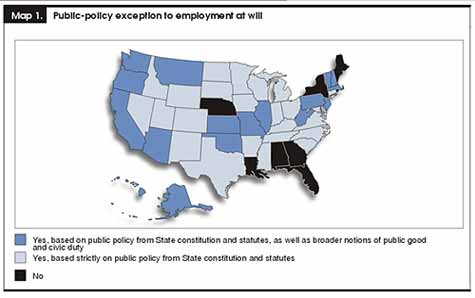Wrongful Termination & Discharge
Wrongful termination and discharge cases
regarding an employee fired by a business happen all the time.
There are over 20 legal grounds for making a claim for wrongful
termination or discharge and over one-half of all cases are won
by the former employee.
In some districts the figure rises to
70-percent of the cases are won by the former employee.
Most who win, contact a personal injury
lawyer first in order to sort out the case against the former
employer. It is important to note that the average pay range for
someone who has been wrongfully terminated is between $35,000
- $40,000 per year, while the average verdict against former employers
is over $300,000.
| |
 Blue
and Light Blue Are At-Will States
Blue
and Light Blue Are At-Will States |
|
Most of the states in the U. S. are employment "at-will"
states and there is no formal contract between employer and employee.
At-will also means that a company can fire its employees at-will
at any time for any reason or no reason at all. Employees are
also free to leave a company at-will for any reason or no reason
at all. Many people think that because they live in an "at-will"
state, that they have no legal rights if they are terminated from
a job.
Wrongful discharge lawyers will look at four areas of the law
to see if their clients have a case including federal and state
statutes, public policy, good faith and fair dealing and implied
contracts. Applicable federal and state statutes include anti-discrimination
laws such as firing a person because of race, national origin,
age, sex, religion, sexual preference, positive HIV/AIDS tests,
disability, height, weight, arrest record, marital status, genetic
carrier status and military service, which are all grounds for
a wrongful termination case.
If the discharge of an employee violates a public policy, such
as termination for jury duty, filing a worker's compensation claim
or refusal to break the law at the request of the employer, then
this is also grounds for a wrongful termination case. Another
common law extension of public policy is whistle blower retaliation,
which is prohibited in nearly all jurisdictions. Employees are
protected for reporting an employer for misconduct to a state
or federal regulatory agency, such as for fraud or for causing
environmental hazards. Statute of limitations to file under the
whistle blower laws may be very short, lasting only a number of
weeks in some jurisdictions, so it is important to check with
a wrongful termination lawyer and file the proper paperwork as
quickly as possible after being discharged.
Eleven of the U. S. states recognize the "good faith and
fair dealing" exception to employment termination. This means
that in every employment relationship, the employer needs to act
in a fair manner and that discharging an employee without "just
cause" or due to maliciousness or bad faith is prohibited.
Many companies in at-will states will say they are at-will employers
but this may be only part of the time. These employers may also
imply to any or all employees (usually in employee manuals or
handbooks) that there are other rules at work such as reassuring
employees that they will only be fired for just cause or that
there is a disciplinary process prior to termination that will
be followed in discharging employees. These kinds of reassurances
may indicate and implied or explicit contract in the eyes of the
courts. In addition, most companies may not fire employees because
their stock options are going to be vested, because either the
implied contract or fair dealing.
While not strictly wrongful termination cases, other employment-related
claims may also be filed such as invasion
of privacy if the employer was spying on its employees or
defamation of character
if the employee's permanent file contained untrue and malicious
statements or even tortious interference with prospective business
relations if the employer is trying to prevent re-employment.
|


